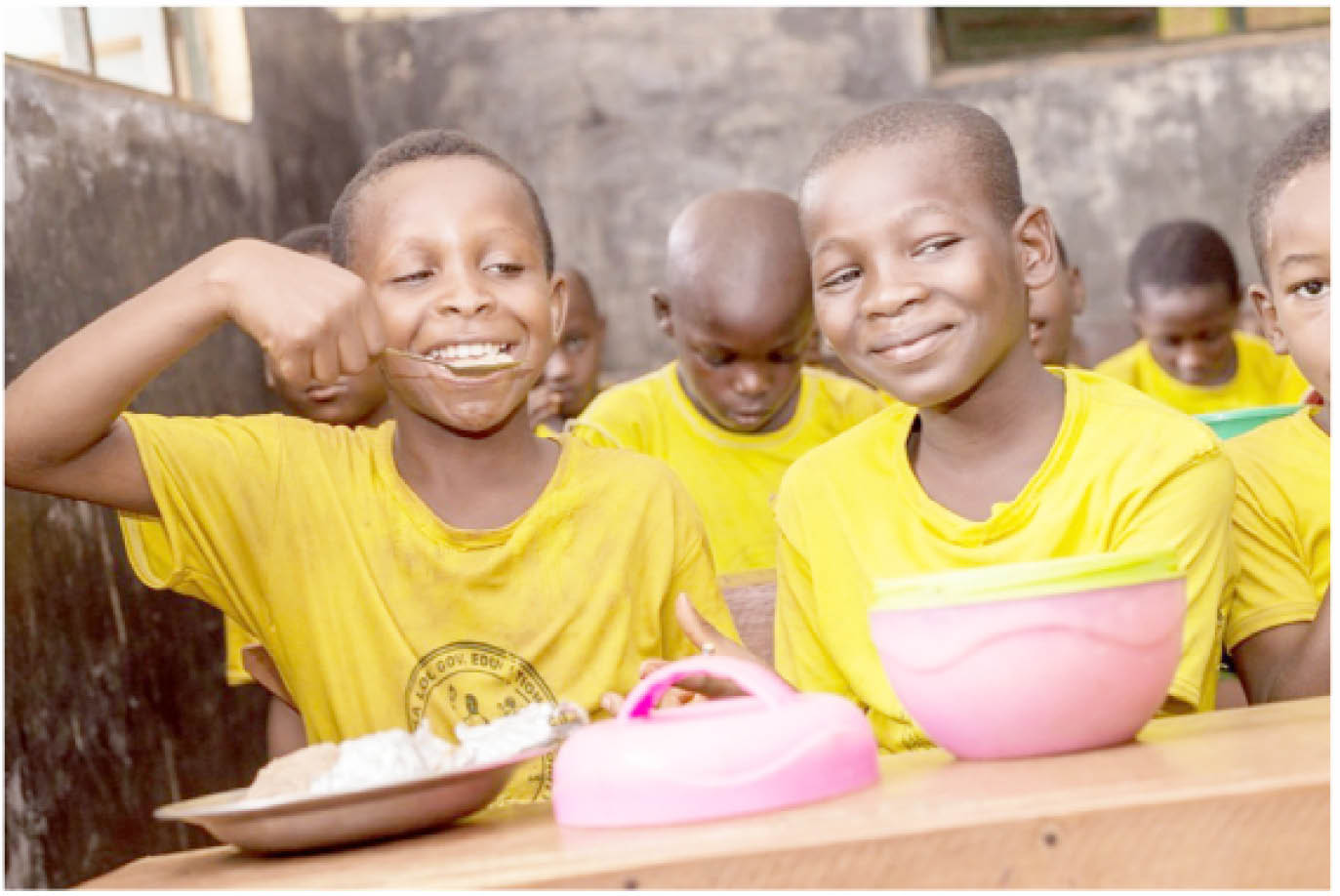The National Home Grown School Feeding Programme (NHGSFP) is a federal government-initiated school feeding programme that aims to improve the health and educational outcome of pupils in public primary schools in Nigeria. The programme, which successfully took off in many states, was fraught with challenges in some states before the Covid-19 pandemic brought it to a halt following the lockdown. While some states have resumed or are trying to, others see it as a mission that cannot be accomplished, especially with inherent challenges.
According to the initiators of the National Home Grown School Feeding Programme, the primary objectives of the programme are to increase enrolment rates of primary school children in the state; improve the nutritional and health status of school children; stimulate local agricultural production and boost the income of farmers by creating a viable and ready market via the School Feeding Programme, and also provide empowerment opportunities for women, thereby improving family and local economy.
- States differ over Buhari’s grazing routes directive
- After long silence, South East leaders condemn secessionist threats
So far, the programme has received both commendations and criticism from stakeholders and members of the public.
In Imo State, the programme appeared to have been stopped in most primary schools in the state while it was never implemented in the majority of them.
For instance, at the Central School Abba, in Nwangele Local Government Area of the state, our correspondent learnt that the programme stopped sooner than it started.
A source in the school told our correspondent that two women were designated to supply food to the pupils, but it was gathered that they stopped after they were owed some money.
At the neighbouring State Primary School Ogwuaga, authorities of the school said that the programme was introduced during the tenure of Governor Rochas Okorocha, but was stopped when Emeka Ihedioha stepped in.
However, they said they could not explain why it was stopped.
In 2019, a non-governmental organisation, Spaces for Change conducted research into the programme in Imo and Abia states.
They discovered that the programme was fraught with a lot of challenges which made it impractical in the two states.
For example, S4C discovered that pupils were served insufficient food rations, low-quality control for meals served in schools, delay in vendors’ payments, unclear selection criteria for vendors, inadequate monitoring and oversight mechanisms, among others.
The group discovered that insufficiency of meals topped the list of complaints from the pupils interviewed. In some cases, enumerators spotted up to three pupils sharing an egg or small portions of food.
This situation, the study found out, was however linked to funding limitations. Vendors demanded an increase in monthly payments to enable them to serve quality meals and increase food portions.
The survey also discovered frequent complaints of diarrhoea after meals – especially potato porridge, adding that this was worsened by minimal involvement of school authorities and community members in the implementation of the program.
In addition, food quality control was lacking as vendors prepared the meals independently, mostly in their homes and delivered at schools. Adequate supervision of meal preparation sites and methods were neglected with poor quality control of the meals served to the pupils.
In Katsina State, Daily Trust on Sunday gathered that the school feeding programme has continued and recorded remarkable success.
According to the Special Adviser to Governor Masari on Empowerment and Special Intervention, Alhaji Abdulkadir Mamman Nasir, under whose office the school feeding programme is being run, the state has seen a remarkable increase from the time he took over.
“Before I took over, only half of the public schools in the state were benefitting from the feeding programme. But when I came in, we enumerated the school pupils, took their names and that of their headmasters and teachers. We discovered that 1,407 schools were benefitting, we increased that number to 2777 schools.

“Initially, 337000 pupils were benefitting, but that has also been increased to 830,000. So, you can see that we have more than doubled the number of beneficiaries in the state,” he said.
In Kaduna State, the school feeding program stopped in the year 2020 during the Covid 19 lockdown in the state. It was gathered that the food vendors, who are mostly women, were screened a few months back across the 23 LG but are yet to be given the money to commence the school feeding of the pupils in the state.
Daily Trust on Sunday gathered that in Kaduna, the programme was first handled by the state government before the federal government later took over around 2019. During the programme, there were lots of complaints of substandard food and also that some of the vendors were shortchanged in terms of payment. These were the major reasons the programme was stopped as at then.
One of the food vendors who simply identified herself as Maman Zibu said the school feeding program stopped before the 2020 school lockdown across the state due to the COVID-19 pandemic.
She explained that at first, they thought the program would continue if schools were reopened but despite the opening of schools they are yet to be contacted on the issue.
“They told us to re-submit our account details that money will be sent to us to continue with the feeding of pupils during lockdown but as I speak, we have not seen anything from them. We are even tired of hoping and waiting,” she said.
According to her, early this year they were called again to get ready for the continuation of the programme but they have been waiting for months without any positive information about the programme and nobody told them why the programme stopped.
She said many women like her had benefited from the programme when it was first introduced nationwide because the little money they made was used to take care of their children and family members, saying they are not happy that the program is suspended as she called on the federal government to continue with the feeding program.
The Federal government’s school feeding programme is yet to commence in Bayelsa State, months after the programme was launched by President Muhammadu Buhari.
Though schools in the state are still on break, a source at the state Ministry of Education informed Daily Trust on Sunday that they are targeting next term for the programme to commence in Bayelsa State.
Recently, Governor Douye Diri had appointed a programme manager for the scheme. Upon assumption of office last year, Governor Diri had pleaded with the Federal Government to commence the school feeding programme and conditional cash transfer scheme.
Diri, who made the plea when the Federal Commissioner in charge of the South-South at the Code of Conduct Bureau, Abuja, Dr Emmanuel Attah, paid him a courtesy call at the Government House, Yenagoa, said that the resources of the state is part of the money used by the Federal government to float the scheme.
Diri, who was represented by his deputy Senator Lawrence Ewhrudjakpo, noted that no Bayelsan has benefited from the key Federal Government interventionist programmes running across the country since the dreaded Coronavirus pandemic crippled global economic activities.
He wondered why states in the South-South, where over 60 per cent of the resources used in executing the programmes come from, were yet to benefit significantly almost three years after their commencement.
The state Commissioner for Education, Mr Gentle Emelah, said the programme will commence in Bayelsa State from next term, adding that the state is at the stage of recruiting cooks who will be in charge of each primary school in the state.
He said: “In preparation for the take-off of the Home Grown School Feeding Programme in Bayelsa State, the governor has appointed a Focal Person (SSA), a Program Manager and equally set up a multi-sectoral committee to drive the process.
“We are now at the stage of recruiting cooks that will be in charge of each primary school across the state.”
In Taraba, thousands of women engaged in the programme from across the 16 local government areas of the state were paid money ranging from N50,000 to N80,000 to purchase food items and ingredients for cooking.
Mrs Lami John, Malama Amina Zakari and Adama Abubakar confirmed to Daily Trust on Sunday that they were paid money last month and have resumed cooking after almost a year without cooking for the pupils.
Daily Trust on Sunday finding revealed that the woman are now waiting for another payment and have stopped cooking pending another payment.
Finding also revealed that enrolment in primary schools across the state has increased while attendance has also improved because of the free meals given to pupils in public primary schools.
However, an officer at the state Ministry of Education coordinating the programme who would not like his name mentioned said the bank charged with payment of the cooks is waiting to receive money from Abuja.

In Kano State, the federal government school feeding has been on, and according to the state commissioner for education Malam Muhammad Sanusi Sa’id Kiru, the state has 1.225 million primary school pupils enrolled into the National Homegrown School Feeding Programme in the state.
He explained that the state is currently reviewing the number of enrolees to conform to the exact number of the state’s pupils enrolled in schools. He added that the ministry has already written to the state bureau of statistics for upward review following the increased number of pupils.
“We have written to the state bureau of statistics which will also write to the National Bureau of Statistics. The national will come over and verify the number for capturing in the National Homegrown School Feeding Programme. However, we have also made some changes in the execution of the programme, to make it more accountable and transparent as well as to meet up with the goal of the programme. Hopefully, we will continue with the programme as soon as schools resume,” said the commissioner.
Similarly, Focal Person, National Social Investment Programme (N-SIP), Baba Amin Zubairu, revealed that N-SIP had already trained and engaged Independent Monitors (IMs), adding that letters of engagement have already been distributed to them including tablets for the effective conduct of their monitoring work.
In Benue State, the Federal Government’s free school feeding programme to encourage enrolment of children still continues but with fewer schools.
A food vendor in Otukpo Local Government Area of the state, who gave her name as Grace, said only two persons in her locality are now part of the food suppliers to few schools still benefitting from to the programme.
“Since last year, my name and that of many other women supplying food to various schools in our vicinity was dropped. Only two women among us are now participating in the programme while the number of schools benefitting from the programme has also been drastically reduced since the COVID-19 era,” Grace said.
Also, the State Universal Basic Education Board (SUBEB) confirmed that the free feeding programme for public primary schools in the state was continuing but with lesser schools as beneficiaries presently.
SUBEB’s Head of Information and Protocol, Sar Erdoo, who spoke to our correspondent by telephone, stressed that though she didn’t have numbers of schools dropped or still participating in the programme as that was within the purview of the NSIP, it was however evident that fewer schools are currently benefitting from the free feeding programme in the state.
When contacted, the Focal Person for the Benue State office of the National Social Investment Programme (NSIP), Dr Terris Damsa, said the programme has not been stopped in the state.
“Feeding Programme is going on in Benue State. Our vendors have just finished feeding for one month and we are expecting payment for the next tranche,” Damsa posited.
Kwara State is among the two states in the entire federation that has yet to start the National Home-Grown School Feeding Programme (NHGSFP) of the federal government. The other is Bayelsa State.
Checks by Daily Trust on Sunday revealed a number of reasons responsible for the failure of the scheme to take off yet in the state.
It was observed that the Covid-19 and its attendant lockdown which coincided with the closure of schools at a time the federal government was planning to enlist the state slowed down the process.
Furthermore, there was also the problem of logistics and funding, including the failure of the state to meet all the criteria and conditions that were needed to implement the programme in Kwara then.
Worried by these concerns, the federal delegation visited Kwara last week to assess what is on the ground following a letter of invitation from the government on its readiness towards implementation.
Although the leader of the federal government team and Special Assistant to the President on National Social Investment Programme (NSIP), Dr Nasiru Mahmud, expressed satisfaction with the “tremendous” progress that has been made, he identified other key areas that needed to be resolve like the non-availability of the State School Feeding Programme Office which he described as “extremely important”.
“The office is supposed to have a programme manager and supporting staff for its day-to-day running. Also, there is a need to incorporate some relevant ministries and agencies like that of information and the National Bureau of Statistics (NBS) for adequate awareness and accurate data and having a budget line for it to guarantee funding on the part of the state. There is a need for the appointment of desk officers across the 16 local governments,” he added.
According to him, although “Our ministry is worried and came down to Kwara to assess the level of readiness, but with the relaxation of the lockdown and resumption of the schools, coupled with other necessary support we are ready to give the state for the programme to take-off, all these will change soon. We are happy about what we saw although there are few issues here and there. But the state government has really shown readiness for the programme now.
“Over 1,500 public primary schools have been identified and over 96,000 pupils of primary 1-3 spread across the 16 local government areas of the state will benefit,” he submitted.
Asked when the programme will eventually take off in Kwara, Mahmud said “We haven’t come up with the timeline but it will be in a matter of weeks.”
On her part, the state NSIP focal person, Hajia Bashirat Abdulrazaq, however, assured the team of the state government’s readiness for the programme.
She said over 1,947 cooks were on the ground to benefit at the flag-off, adding that there will be revalidation as the programme goes on.
Abdulrazaq said the programme would boost the enrolment of pupils and reduce malnutrition among Nigeria children.
“Cooks employed were the parents of the school pupils. So, as the parents benefit, the children benefit and poor farmers who are the fathers also benefit. Its target is the poor, vulnerable people, to eradicate poverty in Nigeria.
Tijjani Ibrahim (Katsina), Mohammed I.Yaba (Kaduna), Bassey Willie (Yenagoa), Magaji lsa Hunkuyi (Jalingo), Ibrahim Musa Giginyu (Kano), Hope Abah Emmanuel (Makurdi), Mumini AbdulKareem (Ilorin) & Jude Owuamanam (Imo)

 Join Daily Trust WhatsApp Community For Quick Access To News and Happenings Around You.
Join Daily Trust WhatsApp Community For Quick Access To News and Happenings Around You.


